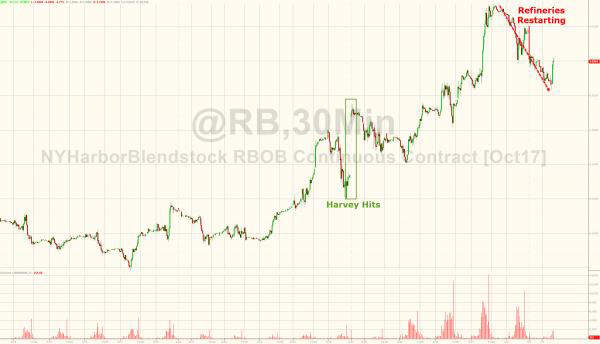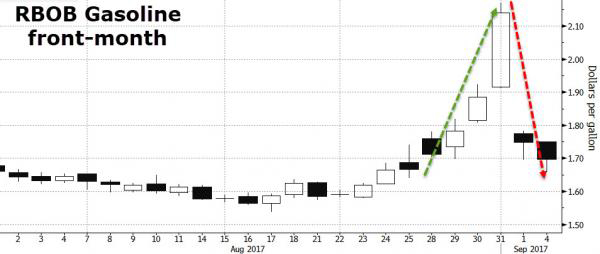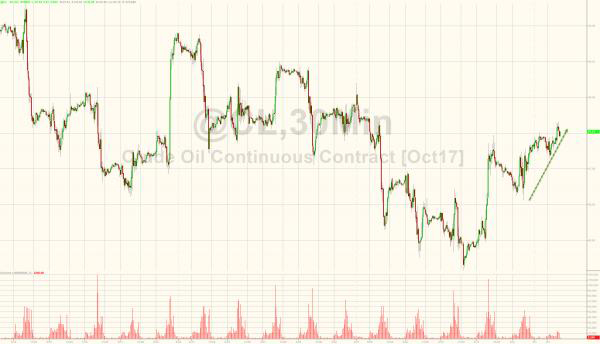Gasoline Prices Tumble As Refiners Resume Operations
Tyler Durden
 RBOB Gasoline futures tumbled to their lowest level in almost a week overnnight as several US Gulf Coast refineries reported their plans to restart operations after the devastation of Hurricane Harvey forced them to shutdown. RBOB Gasoline futures tumbled to their lowest level in almost a week overnnight as several US Gulf Coast refineries reported their plans to restart operations after the devastation of Hurricane Harvey forced them to shutdown.
While about one-fifth of U.S. refining capacity is halted, according to data compiled by Bloomberg, some plants including those operated by Citgo Petroleum Corp. and Marathon Petroleum Corp. are preparing to restart.
The Oct '17 contract was down as much as 4% earlier before a modest bounce.

Moreover, compared to the squeeze in the September contract, RBOB prices have really tumbled...

Of course, this rather spoils Janet Yellen's transitory hopes for a burst of inflation to help her case when she next raises rates and while concerns had risen that higher gas prices could derail the Trump economy, it appears those risks are overblown.As The Hill reports,
Stephen Moore, a fellow at the Heritage Foundation and former Trump transition energy adviser, said "the negative effect will be not pretty."
“We’re talking about maybe knocking half a percent, or one percent, off GDP for a quarter or two, higher gas prices for sure, because Houston is the energy capital of the country. … So all those things are negative.”
Moore said he follows a rule of thumb that every penny increase in commercial gasoline prices takes $1 billion to $2 billion out of the economy from consumers.
That means that as prices rise after Harvey, the economy could be hit even harder, including from lost economic production in Houston — the country’s fourth biggest city — and the spending needed for a major federal recovery effort.
“It’s a question of how much the prices are already starting to rise,” he said. “I don’t know how fast this industry can recover … Could we see gas prices over $3? Potentially. That would be a big hit to consumer finances.”
A disrupted economy, driven in part by stout gasoline prices, could undercut one of President Trump’s most resonant messages with voters.
But with prices tumbling fast, this 'disruption' may merely be a storm in a teacup.
“The disruptions from Hurricane Harvey in the U.S. Gulf Coast are gradually clearing,” wrote analysts at JBC Energy GmbH. “In the broader scheme of things, it appears that so far the energy industry was spared major damages to assets and infrastructure.”
The Energy Department also approved the release of 5.3 million barrels of crude from the Strategic Petroleum Reserve, but hope for refinery reopenings has prompted modest gains in WTI also...

“We’re awaiting news of continued normalization along the Texas Gulf Coast,” says Ole Hansen, head of commodity strategy at Saxo Bank. “Refineries are starting up and the next thing is to gauge the levels in different tanks from crude to gasoline and distillate”

our mission:
to widen the scope of financial, economic and political information available to the professional investing public.
to skeptically examine and, where necessary, attack the flaccid institution that financial journalism has become.
to liberate oppressed knowledge.
to provide analysis uninhibited by political constraint.
to facilitate information's unending quest for freedom.
our method: pseudonymous speech...
Anonymity is a shield from the tyranny of the majority. it thus exemplifies the purpose behind the bill of rights, and of the first amendment in particular: to protect unpopular individuals from retaliation-- and their ideas from suppression-- at the hand of an intolerant society.
...responsibly used.
The right to remain anonymous may be abused when it shields fraudulent conduct. but political speech by its nature will sometimes have unpalatable consequences, and, in general, our society accords greater weight to the value of free speech than to the dangers of its misuse.
Though often maligned (typically by those frustrated by an inability to engage in ad hominem attacks) anonymous speech has a long and storied history in the united states. used by the likes of mark twain (aka samuel langhorne clemens) to criticize common ignorance, and perhaps most famously by alexander hamilton, james madison and john jay (aka publius) to write the federalist papers, we think ourselves in good company in using one or another nom de plume. particularly in light of an emerging trend against vocalizing public dissent in the united states, we believe in the critical importance of anonymity and its role in dissident speech. like the economist magazine, we also believe that keeping authorship anonymous moves the focus of discussion to the content of speech and away from the speaker- as it should be. we believe not only that you should be comfortable with anonymous speech in such an environment, but that you should be suspicious of any speech that isn't.
www.zerohedge.com
|




